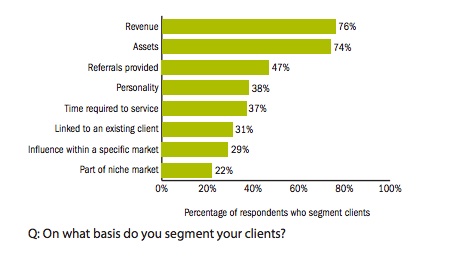It may seem an obvious question however understanding who the most valuable clients are to a firm is not always as simple as it seems. There is often an innate understanding of who they are however it is often not underpinned by any analysis or hard data.
Even when it is analytically understood who the most commercially valuable clients are, and a segmentation strategy has been developed and adopted to recognise tose most valuable revenue generators for the firm, there is usually little consideration given to another important question:
“does the client get it?”
A key part of the rationale for client segmentation in the first place is to work out who warrants more of the business’ resources – who is worth investing more into? While it is absolutely logical to assess the importance of a client to the firm on the basis of their current or future potential monetary value to the business, we should question whether that is enough. Is it all that matters?
Of course the financial value of the relationship does matter. No question about that. We are running businesses that need to be profitable if we are to continue honouring oiur commitments of service to clients and deliver stability and security to our stakeholders. Investment in the most valuable relationships (current and potentially valuable) should be assessed on the basis of probable return for risk or effort undertaken. The same philosophy should be the primary consideration when it comes to client segmentation, with particular emphasis upon “probable return” over the anticipated life of the business. Those with the highest value to the firm become the highest category for service and attention. That is logical…but is it enough?
A client who pays $10,000 per year today is generally assumed to be a higher quality (or higher category) client than one who pays $1,000 per year today. If however the $10k client simply doesn’t get the value of advice, or the value you can provide and treats the professional as little more than an order-taker then they are not probably worth as much as the $1k client who buys into the process and understands the value the adviser delivers.
The first client is a transient…they might stay for some time, but then they are far more likely not to. You are probably “renting their business” in reality. You are a commodity to them. The second however is one who can become an advocate for the business with the right attention and investment of effort, even if their personal spending with your firm on services never rises to magnificent heights. That client is far more likely to generate a very good return for the investment of time, effort & resources because of the potential marketing value to your firm through introduction of other clients.
Most advisers do not appear to consider this when it comes to assessing the value of a client. The majority who do employ client segmentation strategies are still focusing on the immediate value, or cost, of the client rather than their future worth.

Yet, the Holy Grail for advice businesses is a firm where the existing clients are so delighted with the value they receive that they actively advocate and promote you & your brand. The business ideally is one where the primary marketing and new client acquisition is word-of-mouth based….and it just keeps rolling in.
To create such a business there has to be a deliberate focus upon building those advocates, and that means prioritising the resources of the business to give them particular attention and support.
It would not be the worst client segmentation and service strategy in the world if there were simply 3 categories of clients, with substantially different levels of service and “love”. Perhaps:
1. (Future?) Advocates: They get it. They understand the process…they value the advice….they love the planning and shaping of their own future. They enthuse and are socially mobile. They are almost certainly going to keep coming back for more advice and have their professional as a critical part of their decision making team.
2. High Value Clients. They represent high commercial value to the business in the short to medium term. Some will present long term value as well of course, but many will not perhaps. Regardless of their current or potential future revenue value though, they are unlikely to ever become advocates promoting your brand. They do however follow advice generally and there is a very real prospect of them becoming High Value Clients for the business over the long term.
3. Customers. They might represent very high value short term, but the distinguishing feature of this group is that they are transactional in mindset. They have bought something – product or advice – but every interaction requires a new sale: The selling of you again as an adviser. The value of the professional is often challenged, and at the very least it is usually questioned. There is typically a focus upon product, price or performance. However, they are profitable to have as customers….so we keep them.
Give great service to Customers. Give great service and a high level of personal attention to High Value Clients – make them feel special. For those who can become Advocates: give them everything you can.
The clients who “get it“, are probably your best bet for growing your firm and giving you all the business you want.
Related: Segmentation: Why Not Have Everyone as “A” Clients?


